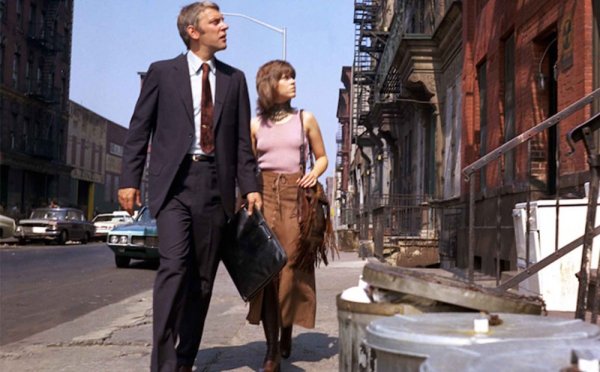- Messages
- 17,483
- Location
- New York City
 '
'Klute from 1971 with Jane Fonda, Donald Sutherland and Roy Scheider
From a 2020 perspective, we've seen the story in 1971's Klute done many times since (and film versions of it go back to, at least, the 1930s), but the humanizing of a prostitute living a gritty life in a gritty city had to jar 1971 audiences used to a cleaner New York City and a cleaner Jane Fonda.
The value here is not the plot (a small town detective [Sutherland] comes to New York City to investigate the disappearance of a local businessman whose only clue is a link to a New York City prostitute [Fonda as Bree]), the value is the cultural moment of a film, sans any code restrictions, revealing both the raw life of a prostitute and the casual drug use, crime and general licentiousness of an emerging-from-the-'60s New York City.
According to the TCM host, the predominantly dark, close shots of Fonda were an intentional decision of director Alan Pakula to emphasize her dark, emotionally claustrophobic world. Fine - got it - but it was taken too far as you want to adjust the settings on the TV as you feel like you are only seeing half the movie.
When the light was allowed to shine - mainly in outdoor day shots - it exposed a grimy New York. This NYC is no longer the shining Apple of Fonda's 1967's Barefoot in the Park, but more the desperate and breaking city of another of 1971's offerings, Panic in Needle Park.
This had to lead many in America to ask - what happened? What happened to New York? What happened to create a world of Brees (Fonda) / of sexual deviants in socially prominent positions / of seemingly middle-class young people strung out on drugs / of shag hairstyles / of braless women having casual sex / of violent pimps / of everything in the '70s that was not the image of pre-'60s America?
Of course, it was all there before (well, maybe not the shag hairstyle), but the volume and exposure of it increased when the '60s said we should let it all hang out. Well, by '71, out it is and - at least in Klute (oddly, not Fonda's character's name, but Sutherland's; having never seen the movie before, I had that wrong in my head for the past thirty or so years) - the cultural revolution's freedom created (or revealed) a dark, ugly world of broken, mean, sad, angry, violent, distraught people.
And the lack of sunshine in the movie is mirrored by the lack of sunshine anywhere in anyone's life. Even when Fonda and Sutherland connect (minor spoiler alert), their love (in a very '60s zeitgeist way) won't work as free-spirt Fonda knows she would suffocate settling down with "square" Sutherland. I guess that its back to the "nightshift" for her.
While there's a lot of detective work, sexual deviancy and me-generaton stuff (prostitute Fonda has a psychiatrist, of course) going on in Klute, the story is perfectly framed and summarized (spoiler alert) by the denouement shot of a man hit by a bullet, falling backwards, shattering a large window and plunging to his death. Klute might not be a rebuke to the '60s' cultural revolution or to the Summer of Love or to Flower Power, but it is, at least, a long, despairing hangover from those once optimistic-in-spirit movements.


